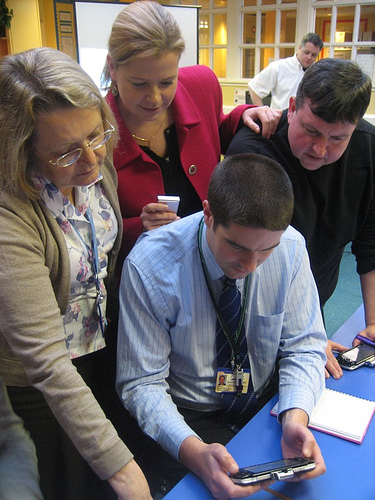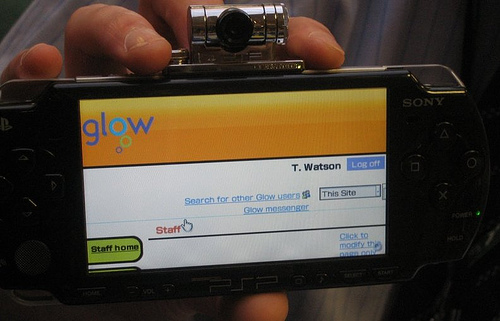

Consolarium blog
Teacher education programmes are in may ways at the vanguard of preparing prospective students for life as teachers in the digital age. It’s great to see and hear of new initiatives being driven by Universities that offer teacher education but it’s even better to hear about students who take on board these ideas and then really make them work in new and exciting ways.
It’s just been announced that thew winner of this years George Gray prize for the best B.Ed(p) thesis for 2006/7 has been awarded to Karen Crichton, formerly from the University of Dundee. Karen is now in her induction year at Denend PS in Fife and is obviously delighted and honoured to have won this award.
Her thesis, ‘The Business People of Tomorrow?’ An investigative Report into the influence of the Commercial Computer Game, Roller Coaster Tycoon 2, on Enterprise Education’ discussed how she managed to integrate this game into her exisiting teaching approaches and how the game encouraged and facilitated the development of skills and knowledge in Enterprise education.
The Chief Executive of the GTC Scotland commented:
“Miss Crichton’s thesis is groundbreaking in many respects and illustrates that the use of computer games by young people has a wider educational value than we may previously have understood. This would go some way to refuting the often expressed view that young people’s use of computer games is negative and harmful to their education.
“The quality of Miss Crichton’s teaching and research combined with the enthusiasm she brings to her chosen area of interest bodes well for the education of her pupils in the months and years ahead.”
Karen became aware of games based learning when she undertook the B.Ed ICT Elective at Dundee University. This elective looked at the creative application of ICT in teaching and learning and had as part of its structure a module focusing on games. Playstations and other games were introduced and the idea of games as a valid tool for learning were discussed and debated. Karen talks of this experiecne and how it helped her develop her ideas for her thesis.
It is fantastic read about teacher education institutes being willing to give students access to innovative ideas such as the opportunities offered in the ICT elevtive at Dundee but even better to then see how a student can take these ideas and make them work in their own practice in such an impressive manner.
We look forward to reading Karen’s work and hopefully learning from her expereince in order to share her expertise with other teachers throughout Scotland.
Very well done Karen.
More Most, if not all the handheld games device projects that have emanated from the Consolarium have so far been based on the Nintendo DS platform. We have for some time been looking at the Sony PSP as a learning tool and after much deliberation and discussion we eventually managed to initiate a project that will explore the potential of this platform as a learning tool.
Most, if not all the handheld games device projects that have emanated from the Consolarium have so far been based on the Nintendo DS platform. We have for some time been looking at the Sony PSP as a learning tool and after much deliberation and discussion we eventually managed to initiate a project that will explore the potential of this platform as a learning tool.
I have been in discussions with Connected Education, who are educational resellers for the Sony PSP, for some time now but I was always doubtful about exploring this device due to the fact that I was not greatly convinced of the educational application of the range of games that were available. However, I met with Mark Stimpfig and Andrew Goff from Connected a few months ago and during this meeting my attitude towards the PSP changed. I was shown a number of applications that I felt added that extra dimension ands accessibility to making the PSP a worthwhile device that could play a significant role in out classrooms. These applications allow content to be created away from the PSP but then played, shared and enjoyed via the PSP. The applications that we looked at included:
• Crazy Talk
• Vlog
• Lecturnity
The PSP plays video, audio, images, it has a wireless browser built in and it plays games. There is also a camera that fits on to the PSP and this offers the chance of a wireless and mobile video-conferencing device. There are also applications such as GoEdit that allow you to create content on the PSP and we are looking at those too.
One local authority had expressed a real interest in looking at this device and so after a meeting with Karen Robertson and the team at East Lothian it was decided that we would host the project in P.6/7 in Campie PS in Musselburgh.
 Yesterday we held our first meeting with the school staff, technical support, ICT development team and LTS representatives. Tony Giddings from Connected Education gave us a tutorial about how to use all the features within the PSP. It was great to see how easy it was to access the web via the wireless network in the school via the PSP. The screen on the device is really quite large and it was simple enough to navigate through a series of web pages using the PSP interface.
Yesterday we held our first meeting with the school staff, technical support, ICT development team and LTS representatives. Tony Giddings from Connected Education gave us a tutorial about how to use all the features within the PSP. It was great to see how easy it was to access the web via the wireless network in the school via the PSP. The screen on the device is really quite large and it was simple enough to navigate through a series of web pages using the PSP interface.
Ollie Bray and Tess Watson were very keen to see how the Glow portal would look on the PSP and when it cam through it really looked good. Compact, accessible and there! This does ask questions and opens doors for pupil accessibility to Glow as it becomes more widely available. Logging in to your work or your own personal space in Glow via a games device seems quite an exciting prospect to me. On another note we are also looking at making Glow available through the Sony PS3 but more of that later.
Today we met with the class teacher, Alicia Macfarlane and the PT Steven Woods where we initiated discussions about appropriate areas of next terms curriculum that would best suit the application of the software and their devices that we are giving the children. Their topic is WW2 and already we have developed a range of ideas that would allow the gradual integration of the PSP as something that will become integral to the teaching and learning experience within the class.
Amongst other things that are currently in the planning stages this is another interesting games based learning project from LTS that will hopefully continue to contribute to the evolving body of evidence about the successful application of handheld gaming devices in teaching and learning.
More
Find us on